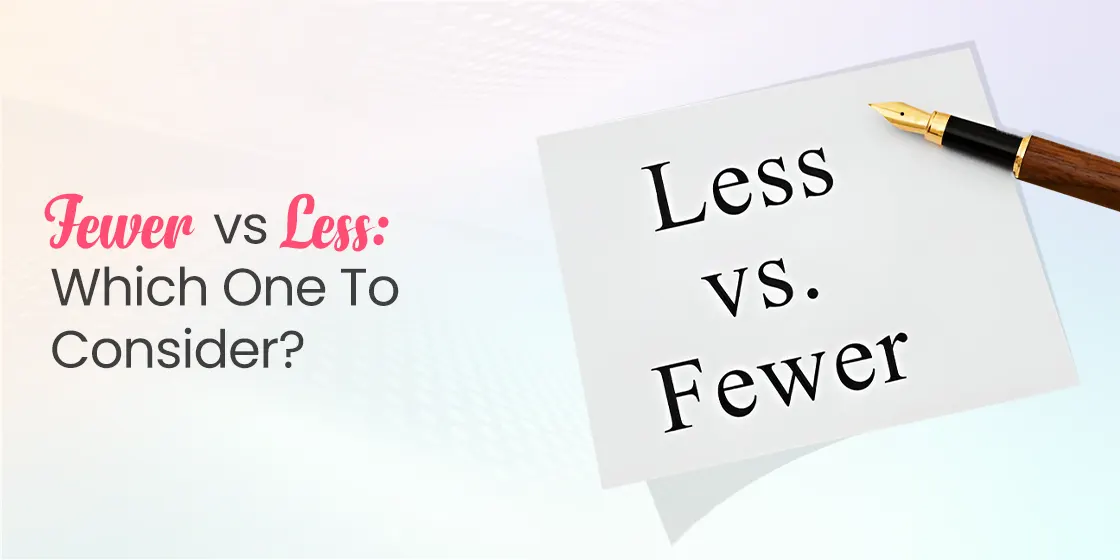Table of Content
Know How to Use Words like Fewer and Less in Sentences
Have you ever paused while writing a sentence and wondered whether to use fewer or less? These two words often cause confusion because they seem to mean the same thing — a smaller amount. However, choosing between them is easier once you understand a simple guideline. By knowing what kind of noun you’re describing, you can confidently pick the right word every time.
The basic rule is that we use fewer when we’re talking about things that can be counted individually. Less, on the other hand, is used with uncountable nouns — things that come in amounts rather than discrete pieces.
Remembering this small distinction can help make your article writing services clearer and more precise. Once you practice using fewer and less properly, it will become second nature, and your readers will appreciate the accuracy. In the rest of this article, we will take a detailed look at both words, explaining their meaning and correct usage methods in sentences. Let’s start from the basics why words like these often confuse writers that are new to the field.
Why Similar Meaning Words Are Often Confusing?

Words that have similar meanings are often confusing because they overlap in usage, yet they’re rarely interchangeable in every context. Even though they can share a general definition, subtle differences in nuance, tone, or appropriateness may make one word fit perfectly and the other feel slightly off. This can leave speakers and writers uncertain about which one to use, especially if they’re not familiar with the word’s full range of meanings.
Context plays a huge role in this confusion as well. Some positive words with similar meanings might only be appropriate in specific situations or formalities. For instance, one synonym might sound casual and conversational while the other is more formal or technical. This makes choosing the right word more than a matter of definition — it’s also about style and the impression you want to make on your reader or listener.
Meanwhile, language is always evolving, so subtle shifts in meaning and usage happen over time. Even native speakers can struggle to stay up to date with these changes. This is why relying solely on dictionaries can sometimes be misleading. Familiarity through reading, writing, and conversation is what ultimately helps you recognize these nuances and feel more confident choosing the best word for your purpose.
When to Use Fewer vs Less?

When choosing between fewer and less, context is key, and it mostly comes down to whether you’re dealing with things you can count individually or things that come in an uncountable amount. Fewer is the word to use when you’re talking about countable nouns — those you can list one by one. Imagine you have five cookies, and someone eats two of them. You’d say, “There are fewer cookies on the plate.” In this context, the focus is on the number of distinct items.
By contrast, less is better suited to listicle articles where you’re referring to a whole or a quantity that you measure, rather than count individually. If you pour some water into a glass and then spill some, you wouldn’t say there’s “fewer water” left — you’d say there’s “less water.” Here, the amount is what matters rather than the separate units, so less is the appropriate word to use.
That’s not to say there are never gray areas — everyday speech sometimes bends the rules. Phrases like less money, less time, or less space sound more natural because money, time, and space can’t be easily counted as distinct units. Keeping this distinction between countable and uncountable nouns in mind will help you use fewer and less confidently and correctly, making your writing and speech clearer and more polished.
Examples of Using Fewer vs Less
To better understand, whether to use fewer or less in sentences, take a look at the example given below. This will let you understand the correct way how both of these power words should be used in precise sentences and articles.
Examples of Fewer
- There are fewer people at the park today because of the rain.
- She has fewer books on her shelf than I do.
- Fewer students attended the morning class than the afternoon one.
- We planted fewer trees this year due to limited funding.
- I wish there were fewer distractions so I could focus better.
- Fewer cars on the road mean less traffic and less pollution.
- He received fewer emails after turning off his notifications.
- Fewer tickets were sold for this concert than last year.
- The new schedule allows for fewer meetings and more work time.
- Fewer mistakes were made once everyone followed the revised process.
- There are fewer cookies left in the jar after the party.
- Fewer employees came to the office on Friday.
- She needs fewer ingredients for this simple recipe.
- Fewer visitors came to the museum during the off-season.
- Fewer opportunities like this will come around, so don’t hesitate to take it.
Examples of Less
- There is less water in the glass than there was an hour ago.
- He feels less tired after taking a short nap.
- This recipe needs less sugar to taste just right.
- Less noise in the library makes it easier to concentrate.
- She has less patience with her younger brother today.
- The drive took less time than we expected.
- You’ll spend less money if you buy the items on sale.
- There’s less light in the room now that the sun has set.
- Please put less salt in the soup this time.
- We can use less electricity if we turn off the lights.
- Less information was available about the event last year.
- He wants less stress in his life moving forward.
- With less rain this summer, the garden hasn’t grown as well.
- The team showed less enthusiasm after losing the game.
- Less work and more rest are the core ingredients to improve health.
Frequently Asked Questions
| What is the meaning of fewer? “Fewer” refers to a smaller number of countable items or things. It is used when comparing amounts that can be individually counted. |
| What is the meaning of less? “Less” refers to a smaller amount of something that cannot be easily counted, like water, money, or time. It is used for uncountable nouns and continuous quantities. |
| Why similar meaning words often confuse writers? Similar meaning words often confuse writers because their subtle differences in usage and tone. This can lead to unclear or incorrect expression, especially when writers aim for precision. |
Final Words
That brings us to the end of this blog in which we have discussed how words like fewer and less differ from each other. It is understood that both of them have similar meanings, but they can’t be used in similar sentences as an alternative to one another. There are specific conditions in which you can use ‘less’ as well as ‘fewer’ in sentences. This article is written to let writers understand what those conditions are and how they should be managed by using right words and terminologies.

Unleash your brand story`s potential with eContentSol – your creative writing companion. We craft narratives that captivate. Ready to elevate your content game? Dive into creativity with us and let`s bring your ideas to life.


